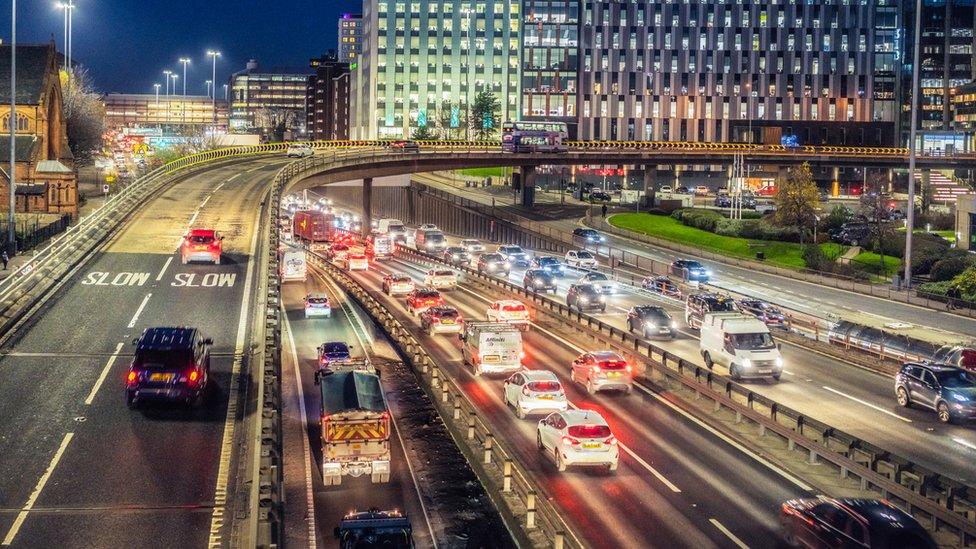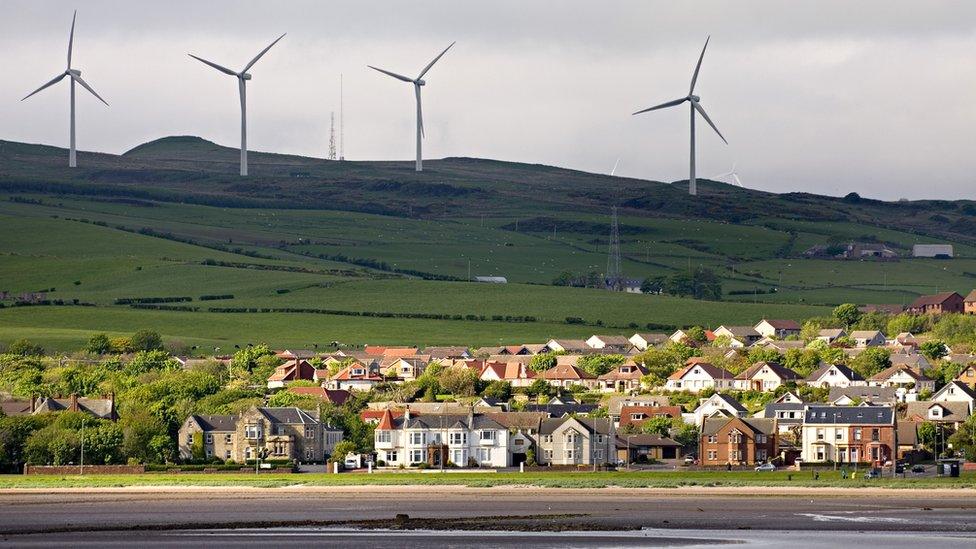New planning rules to help hit Scottish emissions targets
- Published

The government wants to cut private car journeys by 20% by the end of the decade
MSPs have signed off new planning rules for Scotland which aim to help hit climate change targets while cutting the use of private cars.
The new framework will give priority to planning applications for renewable energy schemes including wind farms.
And it will seek to cut car trips and boost city centres by opposing out-of-town retail parks and drive-throughs.
The aim is to create "20-minute neighbourhoods" where all services are within walking or cycling distance.
Planning minister Tom Arthur said the changes would "help build a fairer, greener Scotland" and transform the economy for future generations.
Opposition parties said more should have been included to promote the development of new housing, but the framework was approved by 88 votes to 30.
Planning applications are mostly handled by local authorities, but councillors must work inside a framework drawn up by the Scottish government.
The latest version of that framework states that planners must give "significant weight to the global climate and nature crises" when considering new developments.
It also says that all proposals for renewable energy projects will be supported, including onshore wind farms everywhere other than in national parks and national scenic areas.
Other green energy systems like solar arrays, hydrogen power projects and carbon capture schemes will also be backed, while it is "highly unlikely" that new waste incinerators will get permission.

New onshore wind farms will be supported in almost every area of Scotland
Ministers also want to boost town and city centres by creating "20-minute neighbourhoods" with improved walking and cycling access.
This will include opposition to any expansion of out-of-town retail parks, as well as drive-through takeaways - which will only be supported if local plans say they "would not negatively impact on the principles of local living or sustainable travel".
This also plays into the government's wider target to cut car journeys by 20% by 2030, with the framework aiming to support "transformational reduction in private car use".
As well as backing mass transit projects in Aberdeen, Glasgow and Edinburgh, the document says developments should aim to "minimise space dedicated to car parking" in towns.
That means proposals will not be supported if they "would increase reliance on the private car", while backing will be given to those which are "ambitious in terms of low/no car parking, particularly in urban locations".
Priority will also be given to new cycle lanes and "active travel", public transport links and electric vehicle charging points.
Climate crisis
Mr Arthur said the new framework was "one of the most important changes since the modern planning system was introduced in 1948".
He said: "It prioritises tackling the climate crisis and reaching net zero by supporting development, growth of communities and of the economy in ways that are both sustainable and fair.
"While we won't compromise on addressing climate change, the system will allow planning authorities to bring forward locally tailored policies and proposals that meet their communities' needs and circumstances."
During the Holyrood debate, Mr Arthur told MSPs that the government was still committed to delivering on its past policies of dualling the A9 and A96.
The Scottish Conservatives said the framework would not meet all of the challenges facing Scotland, with MSP Miles Briggs saying it "isn't acceptable in its current form".
He said the "housing crisis" should also be at the heart of the planning system, saying the new framework would "do little to drive forward the number of new homes that Scotland requires".
Labour's Mark Griffin also said homes needed to be built in much greater numbers.
However, his party did vote for the framework, which he said was vitally important for "the communities, local decision makers and businesses who desperately need long-overdue detail about how planning will work for the next decade".